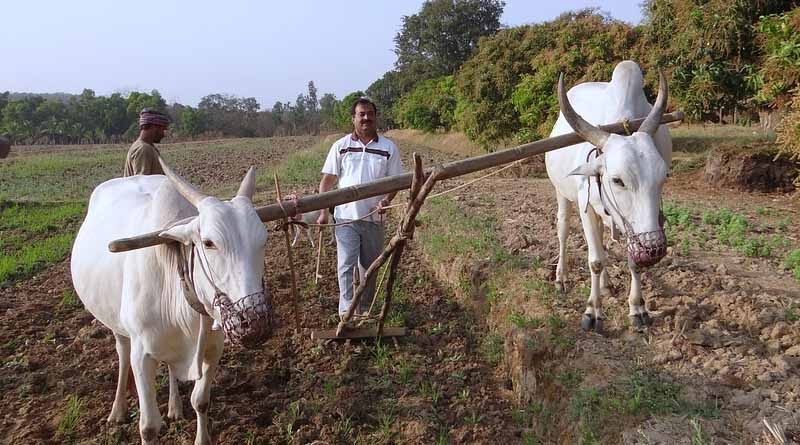


In a big decision, the Union Cabinet has approved the launch of National Mission on Natural Farming with a total outlay of Rs 2481 crore. The mission, which aims to promote natural farming in a mission mode across the country, will reduce input costs for farmers and promote biodiversity. This decision reflects the government's commitment to the welfare of farmers and sustainable agricultural practices.
Unlocking the Potential of Natural Farming: India's National Mission
Background
As the global population continues to expand, the demand for food and agricultural products is skyrocketing. However, conventional farming practices have taken a toll on the environment, leading to soil degradation, water pollution, and biodiversity loss.
To address these challenges, India has embarked on a revolutionary mission to promote natural farming across the country. The National Mission on Natural Farming (NMNF) was launched in 2021 with an ambitious goal of converting 10 million hectares of farmland to natural farming by 2025.
Objectives of the NMNF
The NMNF aims to revolutionize Indian agriculture by transforming conventional practices into sustainable, eco-friendly, and farmer-centric approaches. Its core objectives include:
Mission Implementation
The NMNF will be implemented through a phased approach, with the first phase focusing on establishing 15 clusters in different agro-climatic zones. Farmers will be provided with training, inputs, and guidance to transition to natural farming.
The mission will also promote research and development, market linkages, and farmer-to-farmer knowledge exchange.
Top 5 FAQs
1. What is natural farming?
Natural farming is a holistic farming system that relies on natural processes and inputs to maintain soil health, crop productivity, and biodiversity without the use of synthetic fertilizers, pesticides, or herbicides.
2. Why is natural farming important?
Natural farming practices improve soil health, reduce input costs for farmers, enhance crop resilience to climate change, and promote biodiversity.
3. How does the NMNF benefit farmers?
Farmers participating in the NMNF will receive training, inputs, and guidance to transition to natural farming. The mission aims to reduce their input costs, increase their income, and improve their overall livelihoods.
4. What are the key features of the NMNF?
The NMNF focuses on promoting a holistic approach to farming, including the use of indigenous breeds of livestock, integrated pest management, and water conservation techniques.
5. How can I participate in the NMNF?
Interested farmers can contact their local agricultural extension offices or visit the NMNF website for information on training and support programs.
Conclusion
The National Mission on Natural Farming is a bold and transformative initiative that has the potential to revolutionize agriculture in India. By promoting sustainable, farmer-centric practices, it aims to ensure food security, protect the environment, and improve the livelihoods of farmers. As the mission progresses, it will be essential to provide continued support to farmers and ensure that the benefits of natural farming are disseminated widely.

On the occasion of Vijay Diwas, a day commemorating India's 1971 victory over Pakistan, Rahul Gandhi, Leader of Opposition in Lok Sabha, paid his respects to the brave soldiers who showed indomitable courage, leading to the liberation of East Pakistan and the formation of Bangladesh. The date also marks the surrender of 93,000 Pakistani soldiers to the Indian Armed Forces and is a tribute to the bravery and sacrifice of Indian soldiers. Congress National President Mallikarjun Kharge also highlighted the 1971 victory as a great example of humanity and justice under the leadership of then Prime Minister Indira Gandhi.

Senior Congress leaders respond to Delhi court's refusal to take ED's chargesheet in the National Herald-Young Indian case, emphasizing the lack of evidence and foundation of the case. They accuse the BJP of exaggeration and targeting the opposition, claiming that the ruling has validated their long-held belief that the case is politically motivated. Congress leader Abhishek Manu Singhvi highlights the legality and commonality of corporate restructuring, while Congress general secretary K.C. Venugopal condemns the Modi government's targeting of Sonia Gandhi and Rahul Gandhi without any legal basis.

The Congress party declared a moral and legal triumph after the Delhi court dismissed the Enforcement Directorate's chargesheet in the National Herald-Young Indian case. The judge noted that the chargesheet was based on a private complaint rather than an FIR, making it legally inadmissible. The Congress accused the Modi government of maliciously targeting its leaders and misusing central agencies for political gain. They vowed to continue fighting for truth and democratic rights, asserting that nothing could deter them from their mission.

India commemorates Vijay Diwas every year on December 16 to honour the soldiers who sacrificed their lives during the 1971 war with Pakistan, which resulted in the creation of Bangladesh. As part of this year's celebrations, the Indian Army displayed a reconstructed Turkish armed drone, Yiiha, which was shot down by India during Operation Sindoor on May 10. The Kamikaze class of drones, also known as "suicide drones," were used by Pakistan to target Indian military and civilian installations, but were almost all destroyed by the Indian military.

India celebrates the 54th Vijay Diwas, honoring the bravery and sacrifice of its soldiers in the 1971 war that led to the liberation of Bangladesh. Political leaders, including Prime Minister Narendra Modi and President Droupadi Murmu, pay glowing tributes to the armed forces and their unmatched courage. The Army marks the occasion by recalling the historic triumph and the flawless coordination between different branches of the military, with an impressive Military Tattoo in Kolkata.

Renowned spiritual leader and former BJP MP, Ram Vilas Vedanti, passed away at the age of 67 due to a heart attack. Known for his significant role in the Ram Janmabhoomi movement, Vedanti had been admitted to a hospital in Rewa for a blood infection and low blood pressure. Attempts to transport him to a better medical facility were unsuccessful due to bad weather. Political leaders, including Uttar Pradesh Chief Minister Yogi Adityanath, expressed their condolences and praised Vedanti's contributions to society.

Indian Ambassador to the United Nations, Harish P, slammed Pakistan for misusing international platforms for its hostile agenda against India at the UNSC Open Debate on “Leadership for Peace”. He objected to Pakistan’s reference to Jammu and Kashmir and questioned its democratic credentials while reaffirming India’s stance on cross-border terrorism. This reflects the ongoing strain in India-Pakistan relations and New Delhi’s determination to counter any attempt by Islamabad to internationalise bilateral disputes.

As Delhi's air quality reached hazardous levels with an AQI of 500, the city saw 228 flight cancellations and over 400 diversions. In response, the regional government ordered all schools up to Class 5 to shift to online classes. The severity of the situation has also prompted advisories from the Singapore High Commission for its nationals living in Delhi and NCR to stay indoors and wear masks when going out.

A fierce gunfight broke out between security forces and terrorists in a remote village in Jammu and Kashmir, resulting in the death of a policeman and injuries to a terrorist. The encounter was based on specific intelligence inputs, and the terrorists are believed to be affiliated with the Pakistan-based Jaish-e-Mohammad outfit. Despite facing difficulties due to darkness and rough terrain, security forces continue efforts to neutralize the remaining terrorists as the operation has been suspended for the night and will resume at first light on Tuesday. With high alerts in place, the area has been cordoned off to prevent any further attempts by the terrorists to escape.

Controversy swirls around Bihar Chief Minister Nitish Kumar as a video goes viral of him attempting to remove the hijab of a Muslim woman doctor during an appointment letter distribution ceremony. The incident has been met with widespread outrage and criticism from opposition parties, with calls for Kumar's resignation. Shiv Sena UBT leader Priyanka Chaturvedi has also condemned the act, calling it a "public harassment." This incident raises concerns about safety and respect for women in the state of Bihar.